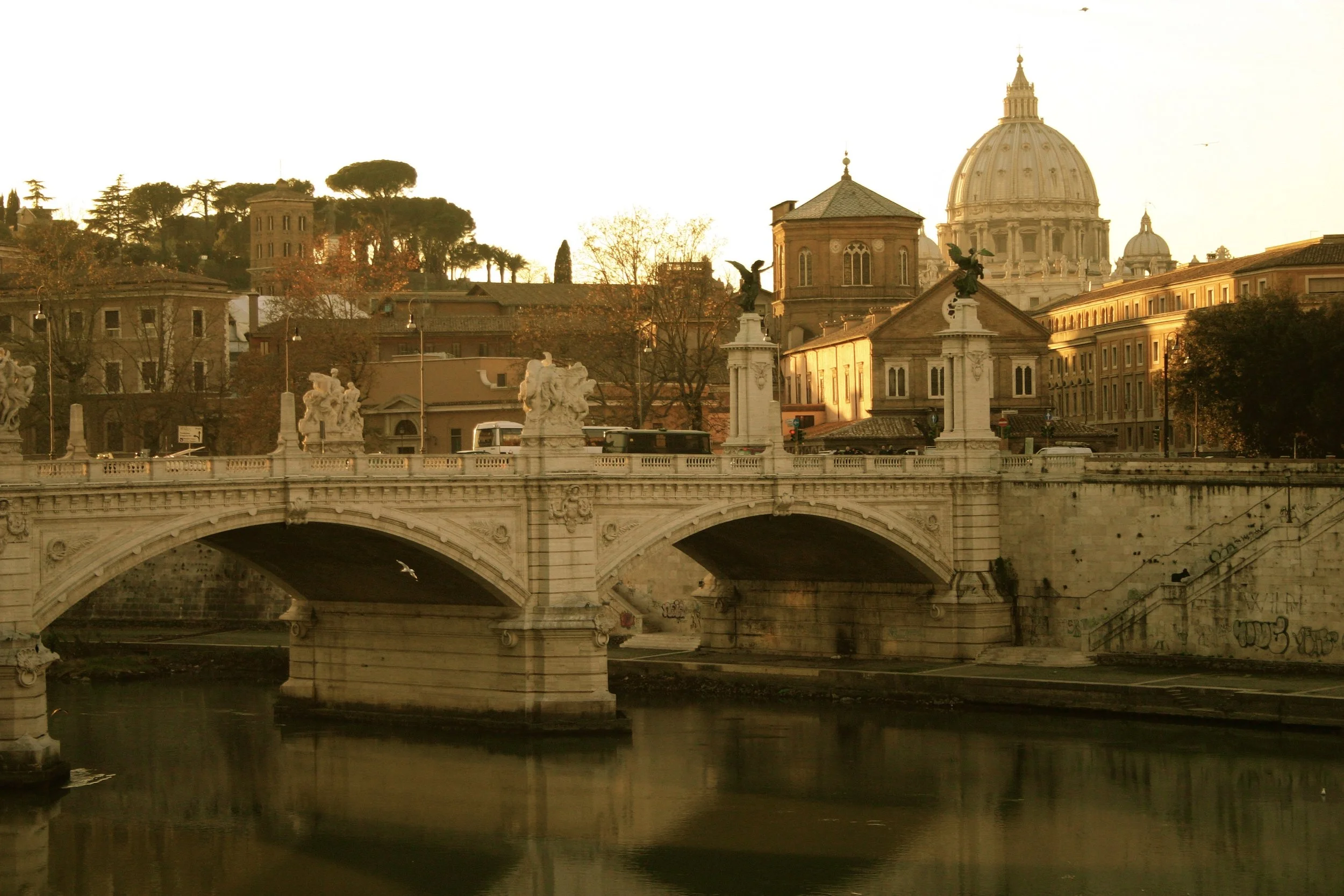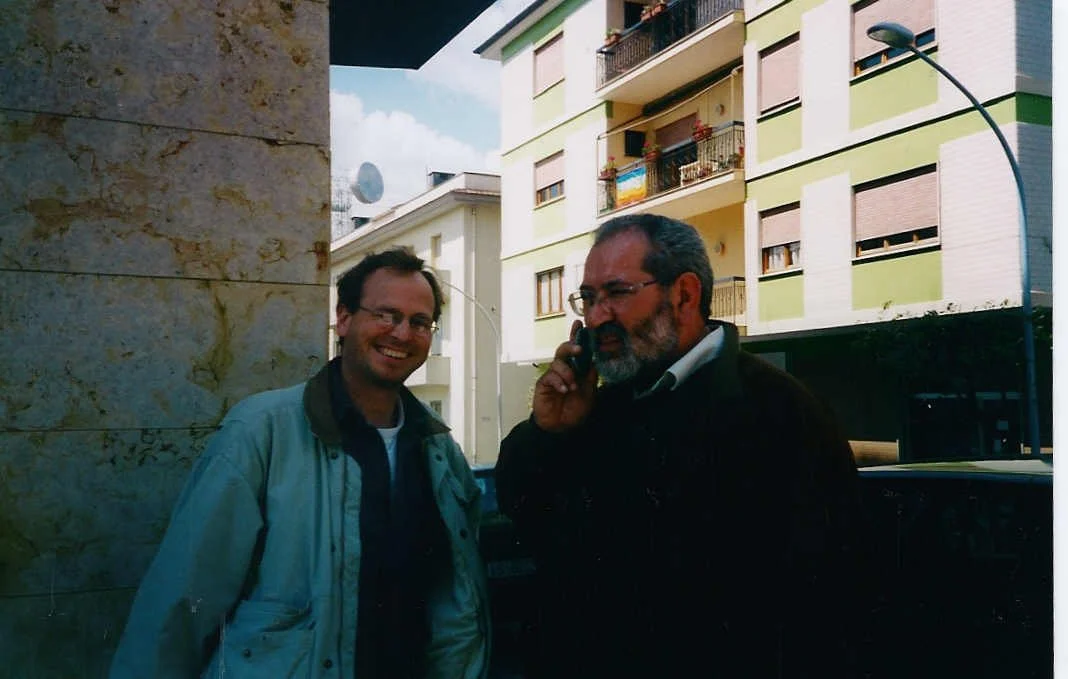When in Italy, Just Say No
I wrote this essay back in 2003 or so, when I had just gotten engaged and was living abroad in Italy for a month. (Later changed to a year.) This essay has never seen the light of day until now. I’ll offer some current thoughts on the piece at the end. But first, the essay.
I was fourteen the first time I visited Italy on a school trip. It was one of those Venice-today, Pompei-tomorrow bus tours, and if it weren’t for the photos I wouldn’t remember much of it. But one scene has always stood out in my mind: Our bus had pulled into a highway rest stop for lunch, and I found myself in line behind a burly Italian mom and her toddler. “Mama,” the little boy pleaded, “Io voglio una Coca-Cola.”
Mama, I want a Coca-Cola.
“No!” Mama exploded, slapping her fist on the checkout counter in such a thunderous way that I nearly returned my own Coke to the refrigerated case.
I don’t care what anyone tells you, the most important word in the Italian language is not pasta, or vino, or even arrivederci or ciao. The critical word that a longtime traveler to Italy must master—and be prepared to say loudly and often—is no.
In some cultures, people have trouble saying no. Guidebooks on Japanese etiquette, for example, alert business people that they’ll rarely hear a negative pass the lips of their Japanese colleagues. There’s yes, and there’s a hesitant yes. Only an attentive traveler can tell the difference.
No such ambiguity surrounds an Italian “no.” From childhood, Italians master a positively Vesuvian “no,” and wield it to set boundaries between themselves and their ever-encroaching cadre of friends and family. I learned this the hard way, when I returned to Italy a few months ago to visit my fiancé, an American who has been living in Rome on and off for two years. We decided to look up my relatives, whom I hadn’t seen since that first boyhood trip. They lived south of Rome, in Molise, which my fiancé’s hip Roman friends described as an agrarian province in search of an identity.
“The further south you go,” one woman, a filmmaker, told us, “the more you have to contend with a kind of enforced hospitality.”
“They were very nice to me the last time I came,” I admitted.
“Now you’re coming with your future wife. They will want to impress you. Just stand your ground.”
The day before our trip, I phoned my cousin Pasquale. “If you’re staying in Rome for the month,” he said, “you’ll need a car. I have a little one that I never use. You must take it.”
A delightfully walkable city.
The idea of having a free car to tool around, say, Tuscany and Umbria, was tempting, but Denise and I preferred traveling by train: We paid our fares, enjoyed the scenery, and strolled around the cities of our choice without anteing $4.50 a gallon to gas up. If we really needed a car, we would rent. A rental absolved us of liability and, frankly, nagging feelings of familial obligation. My grasp of Italian is not the best, but I managed to say that driving a car in Rome—not to mention parking it—appealed to me as much as being shot at dawn. “Thanks,” I said, “but we don’t need one. We walk everywhere we need to go.”
“That’s ridiculous,” said Pasquale, “Rome is a big city. The biggest. You must have a car.”
Horrified by our intention to take the train, he insisted on picking us up in Rome and chauffeuring us to his home. We acquiesced. I had not seen my cousin in years. He had grown into a jovial fellow with the manners and paunch of a country squire. He drove us around his province in the shadow of the Apennines, pointing out projects that he, an architect and engineer, had designed or supervised: churches restored, tunnels dug, homes built. At day’s end, he took us back to his office, and stepped out of his Mercedes.
“I’ll go get your car,” he said, and wandered off to a small garage at the rear of the building. Seconds later, he was backing out a tiny Renault Twingo, which looked like a Swanson’s TV dinner tray on wheels.
My fiancé poked my side. “Didn’t you tell him we didn’t want the car?”
“Yes,” I said.
“Did you say ‘no’? Or did you say ‘no,’ and then tell him why you didn’t want it?”
Denise had spent too much time under the Roman sun. To my naïve mind, a brusque “no” was appropriate for annoying vendors that prowled Rome’s piazzas, but far too rude to use on family. It seemed better to decline gratefully, stating the reason for my refusal. This was my downfall. Pasquale interpreted everything I said as an obstacle he, my illustrious host, was expected to make disappear.
Denise persuaded him to leave the Twingo in the garage and head home for dinner. Back in the Mercedes, the verbal parrying went something like this:
ME: I don’t mean to offend you. I hope you understand. I can’t take this car. It would be too much trouble.
PASQUALE: What trouble? I never use it.
ME: It’s too much responsibility. It might get stolen.
PASQUALE: So what? It’s an old car and I’d be glad to get rid of it. You use it. The end of the month, I’ll light a match and incinerate the thing. I care nothing for it!
ME: I don’t have an Italian driver’s license.
PASQUALE: You don’t need one. I checked. An American license is fine.
ME: (now spluttering) I can’t drive stick!
This last objection silenced him. As we pulled into the gates of his compound, he shook his head. “Davvero?” he said. “Really?”
I didn’t think this was a big deal. Automatic transmission is ubiquitous in the States, but rare in Europe—hence the pricy mark-ups on “American-friendly” rental cars in Italy. I had never learned to drive standard. Big whoop. Woody Allen doesn’t drive at all.
The idea appalled Pasquale. That night, as we tucked into slices of prosciutto and fresh mozzarella, he relished telling his two teenaged sons that their American cousin couldn’t drive. The kids chuckled. “It’s a disgrace,” Pasquale went on. “You must learn to drive. In Italy, every man loves three things: women, soccer, and cars.”
Despite this dig at my masculinity, I slept soundly figuring that the car business was finito. But the next morning, the Twingo was parked in the driveway. Pasquale dangled a set of keys before me.
“Today you learn to drive,” he said.
It was a moment that cried out for a no, but I was speechless. What was it with this guy? Was he so pushy, so thickheaded, that he thought I was still resisting his hospitality? Or was he constitutionally stubborn?
It didn’t matter. I had an ace up my sleeve. Over the years, my father, my brothers, and college buddies had tried to teach me to drive stick, and all had failed. The thought of foisting such an unteachable pupil upon Pasquale was delicious. I accepted the keys.
We then embarked on one of the strangest driving adventures I’ve ever had in a foreign land. I drove haltingly up and down the road in front of his house. Start. Stop. Halt. Lurch. Repeat. I saw sad-eyed cows, quizzical horses nibbling on velvety fields, streams fat with trout, and mountains thick with snow. The Twingo sputtered and stalled its way up and back.
“Destra! Sinistra!” Pasquale shouted, while I clumsily translated his words into English in my head. Right! Left!
At long last, he threw up his hands in disgust. “Basta!” he yelped. “Enough! Pull over and shut it off.” Glaring, he announced, “You cannot drive in Italy! You worry too much. Learn to drive in America first, and then maybe you can drive here someday.”
Relieved, I thanked him profusely as we switched seats. Don’t worry, I assured him, I would tell everyone back home of his patience and generosity as a host. He brightened at this, and another thought popped into his head as he drove back to the house.
“You know,” he said, “My son has a motorcycle—”
“No!” I said curtly. This time I meant it.
Street scene, 2003.
“Yeah, hello? My idiot American cousin is in town. He can’t drive and is dangerous behind the wheel. Can I rent a dump truck?”
Twenty years later, I look at this essay and think the premise is overstated. While I do think learning to say no is a big issue in countries where pushy hospitality is commonplace, I also think I personally had a problem setting boundaries. Still do. But it’s a funny piece, and I hope I haven’t portrayed my cousin poorly. By the way, as of July 31, 2023, gasoline in Italy cost $8 a gallon. At that price, I would have torched his car.
That year abroad yielded ample material for future writing projects. Don’t believe me? Check out my Italian mystery here.
Photos copyright Denise Kiernan

